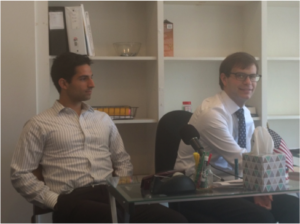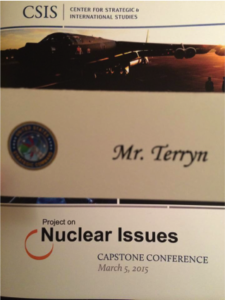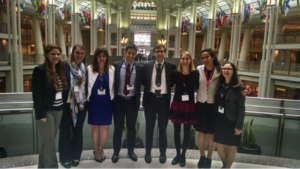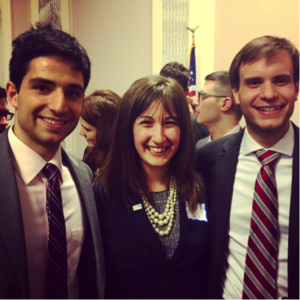My Scoville Experience
As I depart Washington, DC after three years at the Center for Arms Control & Non-Proliferation, I find myself reflecting on my time as a Scoville Fellow (and where better to house these reflections than on the Scoville Blog). If you are short on time, consider this my thesis statement: The Scoville Fellowship provides passionate and talented young professionals with the opportunities and mentorship to pursue their dreams in the peace and security field.
Applying for a Scoville Fellowship:
As a senior studying public policy at the University of Michigan, I was passionate about reducing the threat of nuclear weapons. I felt, if we make a mistake in the nuclear realm, the other policies I was studying would no longer matter.
I found the Scoville Fellowship online, which looked like an excellent opportunity to work to reduce nuclear threats. I remember reading about testimonials and biographies from the current and former fellows with excitement. I also remember questioning whether I should apply, because of the sheer talent and pedigree that the fellowship has cultivated over the years.
But if you are wondering whether you should apply or feeling timid about your chances, there is something you should know. Every Scoville application is read and reviewed by members of the Scoville board. If you are passionate about issues of peace and security, you have nothing to lose by showcasing that passion in an application.
Opportunities & Choices:
Newly-selected Scoville Fellows have an important decision to make: where should they complete their fellowship? The variety of peace and security organizations available to incoming Scoville fellows is immense – take a look here.
My choice was an easy one: The Center for Arms Control & Non-Proliferation had everything I wanted in a host organization. They offered me the chance to work on issues I was passionate about: US-Russia nuclear security cooperation, countering the threat of an Iranian nuclear weapon or a credible North Korean nuclear deterrent, and reducing the risk posed by nuclear weapons and their spread. The organization educated and worked with members of Congress and their staffs, interacted with various departments within the executive branch, and coordinated with the other organizations in the peace and security field. It also employed several former Scoville fellows as employees and members of its board, providing in-house mentorship for my Scoville experience.
Working at the Center:
Leadership at the Center for Arms Control & Non-Proliferation encouraged me to make the most of my fellowship opportunity. I was fortunate to publish under my own name on topics like countering nuclear terrorism, North Korea’s nuclear program, the potential use of nuclear weapons against Russia in Ukraine, and restructuring the US nuclear arsenal. I had the opportunity to  engage with members of Congress and their staffs and to provide briefings on a variety of nuclear non-proliferation and national security topics.
engage with members of Congress and their staffs and to provide briefings on a variety of nuclear non-proliferation and national security topics.
During my time at the Center, I also had the opportunity to take my knowledge to the media, participating in live TV and radio interviews regarding North Korea’s nuclear program and even being featured on the Center’s own Nukes of Hazard Podcast (hosted by former Scoville Fellow James McKeon).
Recording for the Nukes of Hazard Podcast
with Host/Creator/Producer James McKeon
Being Interviewed by TRT World on North Korea’s Nuclear Program
The highlight of my Scoville experience was being flown to STRATCOM at Offutt Air Base near Omaha, Nebraska to give a presentation for the Center for Strategic International Studies’ Project on Nuclear Issues (PONI). I was invited to discuss the restructuring of the U.S. nuclear arsenal and the options and challenges associated with reducing the overall size of the arsenal. These kinds of opportunities are incredibly rare for young professionals in the national security space, which makes programs like the Scoville Fellowship and PONI so valuable for the development of future leaders in these fields of study.
Name Placard for PONI
Conference at STRATCOM
 Overall, what I found most valuable from my Scoville experience and three years at the Center was the exposure I had to knowledgeable experts and leaders in the field. I had the chance to work and learn from experienced military leaders and diplomats, experts on sanctions policy, missile defense policy, and subject matter experts who have traveled countless times to Iran and North Korea. The program also coordinated meetings between current fellows and high-level government officials. As an example, we met with an Assistant Secretary of State in the morning and a member of the National Security Council after lunch. The mentorship and access that these meetings provided was atypical for young professionals in Washington, D.C. and another example of how the Scoville Fellowship works to train the next generation of leaders in the peace and security field.
Overall, what I found most valuable from my Scoville experience and three years at the Center was the exposure I had to knowledgeable experts and leaders in the field. I had the chance to work and learn from experienced military leaders and diplomats, experts on sanctions policy, missile defense policy, and subject matter experts who have traveled countless times to Iran and North Korea. The program also coordinated meetings between current fellows and high-level government officials. As an example, we met with an Assistant Secretary of State in the morning and a member of the National Security Council after lunch. The mentorship and access that these meetings provided was atypical for young professionals in Washington, D.C. and another example of how the Scoville Fellowship works to train the next generation of leaders in the peace and security field.
Building Community:
The last thing I’d like to note about the Scoville Fellowship is the sense of community it builds amongst its fellows. With several Scoville events a year, the fellowship does an excellent job fostering connections between the current and former fellows. Former fellows provide advice and mentorship for the  newest crop of fellows, who in turn will mentor their successors. As the Scoville fellowship continues to grow, its alumni continue to spread into positions throughout the State Department, Pentagon, legislative branch, media, academia, intelligence community, and beyond. It is my humble opinion that the more of my talented Scoville colleagues in policymaking positions, the better off we will be.
newest crop of fellows, who in turn will mentor their successors. As the Scoville fellowship continues to grow, its alumni continue to spread into positions throughout the State Department, Pentagon, legislative branch, media, academia, intelligence community, and beyond. It is my humble opinion that the more of my talented Scoville colleagues in policymaking positions, the better off we will be.
Current & Former Scoville Fellows at the
Carnegie Nuclear Policy Conference
As I leave DC and head to Stanford Law School, where I hope to continue my engagement with issues of national security and diplomacy, I thank the Scoville Fellowship and Center for Arms Control & Non-Proliferation for giving me the opportunity to do meaningful work on issues I cared about and to work with talented, dedicated young professionals who became dear friends.
Fall 2014 Scoville Fellows(L-R): Greg Terryn, Allie Van Dine, & James McKeon
Greg Terryn was a fall 2014 fellow at The Center for Arms Control and Non-Proliferation and is currently a student at Stanford Law School.

